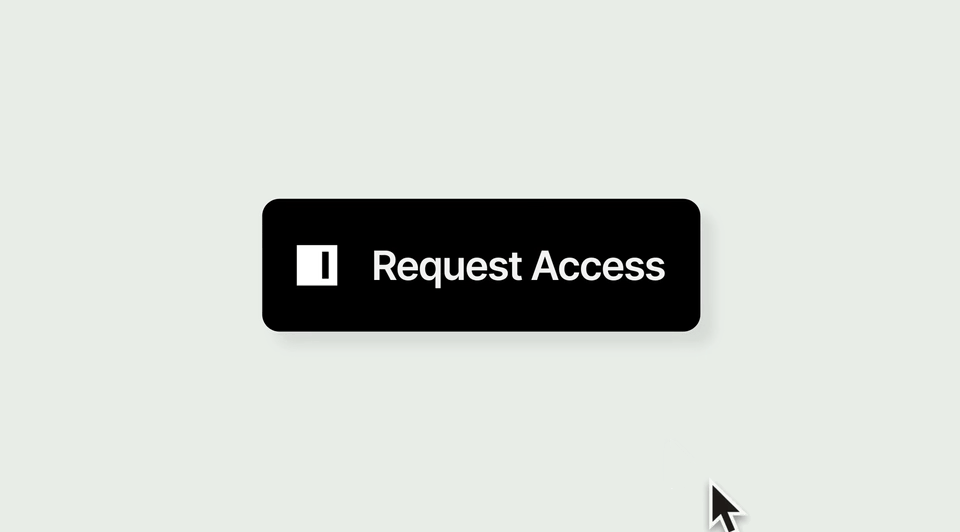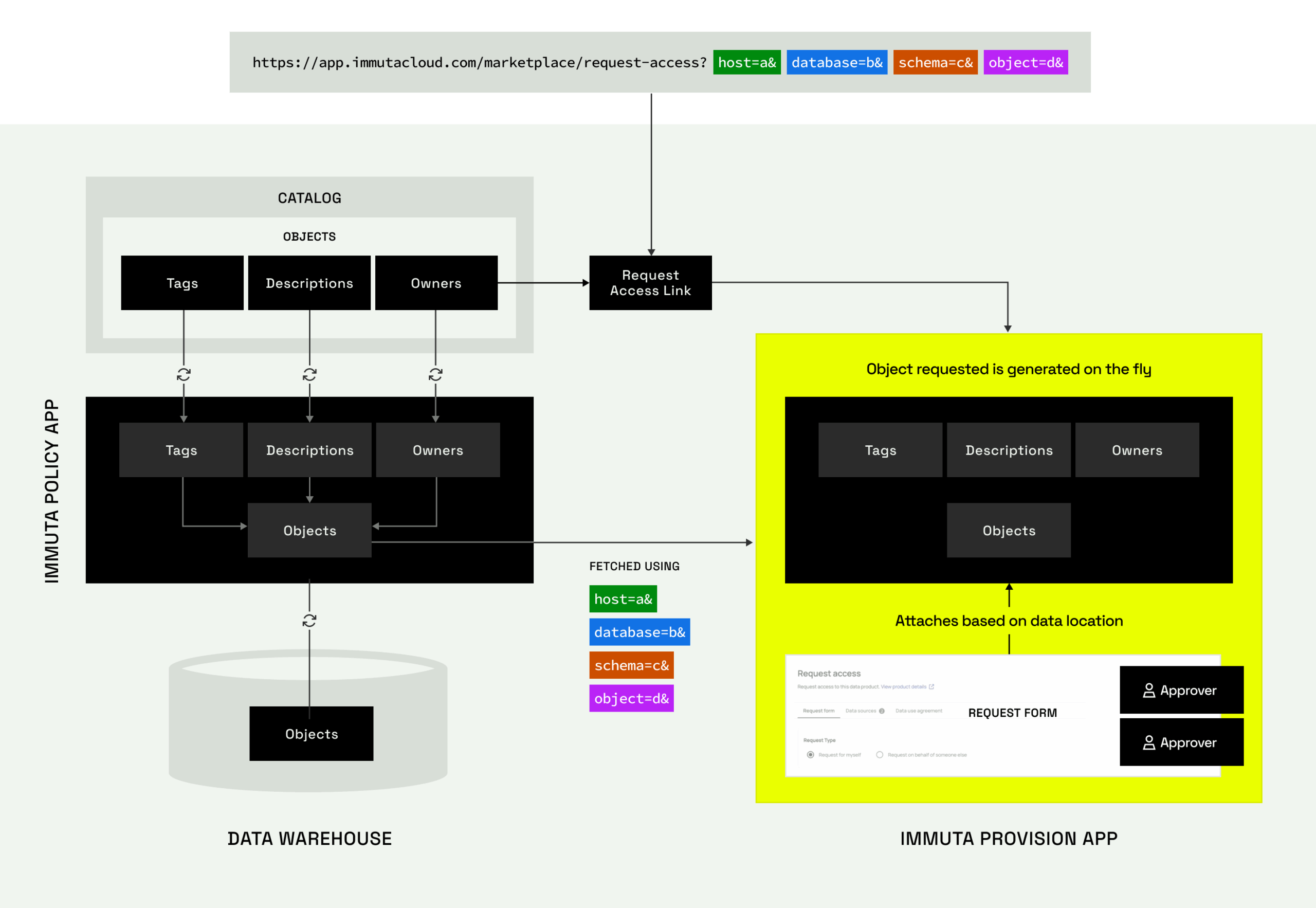
For years, organizations have invested considerable time and resources in building robust data catalogs. From curating assets and tagging domains to ensuring governance and quality. But for all their power, these catalogs have stopped just short of one critical step: actually granting access to the data. That final last mile of the data journey, the provisioning process, has remained slow, manual, and fragmented.
Until now, data access requests lived outside of the catalog experience, disconnected from where data consumers work. That changes with Immuta’s new data catalog Request for Access integrations, which bring governed access directly into the catalog workflow.
As part of Immuta’s November Provisioning Update, our regular release of new capabilities that make data access faster and more governed, we’re closing that gap. Most organizations use data catalogs like Alation, Atlan, Collibra, Snowflake Horizon, or Databricks Unity Catalog to help employees find and understand data. But discovering data is only half the battle, getting access to it is often slow and manual. Immuta now integrates directly into these leading catalogs (and even custom-built ones), allowing users to not only discover data but also request and receive governed access instantly. With complex approval workflows, AI-assisted decisions, time-bound access, and immediate provisioning, data consumers can now get the access they need, securely, without ever leaving their catalog.
Before: Catalogs were the destination, not the door
Traditionally, catalogs were where discovery ended. A data consumer could browse for assets, such as tables, schemas, or datasets, but when it came to actually gaining access, the process broke down.
They’d have to open a ticket in ServiceNow or Jira, wait for multiple reviews, and navigate disconnected approval workflows across IT and governance teams. In many enterprises, this meant three to four weeks before data access was finally granted, using systems that were never built for data provisioning in the first place.
Meanwhile, data teams were left stitching together identity systems, access management tools, and custom integrations to manage approvals and provisioning. Governance remained siloed, resulting in a decline in productivity.
Now: Immuta turns catalogs into access gateways
Immuta’s new data catalog integrations transform these static catalogs into actionable access hubs.
Now, when a user finds the data they need — whether it’s a single table, a schema, or a data product — they’ll see a native “Request access through Immuta” button right inside their catalog.

That simple click triggers Immuta’s secure request, approval, and provisioning workflow, automatically enforcing governance and access policies behind the scenes.
Immuta’s magic link technology makes this possible. Each catalog can embed a unique Immuta link that dynamically identifies the object (table, schema, view, file, model, etc) being requested. Immuta instantly recognizes the object and launches the appropriate (potentially multi-step) approval flow. There’s no pre-registration or manual setup required.
For catalog publishers, this means they can continue publishing assets without considering Immuta at all. For consumers, it means discovery and access are finally unified.
The approvers have the most to gain. They have control over what questions are asked of the consumers at request time, and they can associate customized data use agreements for the consumers to agree to. They have rich details into what data is being requested, how it is tagged, its sensitivity level, and Immuta AI Review Assist will make recommendations on if to approve, temporarily approve (for how long), or deny based on trends of past approvals – speeding decision making and increasing consistency. Historical decisions are also kept to help quarterly access reviews.
It doesn’t stop there. Users can also request exceptions to masking policies directly from their catalogs.
For example, if a data table contains masked columns due to privacy or regulatory requirements, a user can request to unmask a specific column. Immuta then handles that entire exception process, routing the request through the proper approvals with governance, legal, and security teams, and automatically applying the policy change once approved.
This enables users to not only understand the policies applied to data but also to request exceptions safely and transparently, thereby optimizing every aspect of the data access workflow. For a closer look, see how Immuta’s Policy Exception Workflow works.
Why it matters: The last mile of data provisioning
This isn’t just a feature, it’s a breakthrough in how governed data ecosystems operate.
- Accelerated access: Customers like General Motors have already seen access times drop from three to four weeks down to two minutes.
- Unified experience: Data consumers stay in the tools they already know, their catalogs, while Immuta manages the entitlement management workflows.
- Streamlined exception management: Policy exceptions are handled automatically through Immuta’s workflow, connecting data consumers and approvers in a single, auditable process.
- Preserved investments: Chief Data Officers can finally turn years of catalog investments into a functional, self-service marketplace that drives measurable ROI.
Together, this creates a seamless flow: discover, request, approve, and use — all in one motion.

How it works: Automating access and approvals
When a user clicks “Request Access” in their catalog, Immuta’s integration automatically handles:
- Object recognition: Identifying the asset and its metadata from the catalog.
- Form routing: Attaching the right request form and approvers based on object hierarchy (database, schema, table, or view).
- Automated provisioning: Applying policies and granting access in the underlying data platform.
- Governance synchronization: Ensuring requests, stewards, and approvals stay aligned between the catalog and Immuta’s policy engine.

Because of this deep linking, organizations can now manage access at the most granular level, down to object-level requests that were previously impossible in catalogs.
The bigger picture: Powering the data provisioning ecosystem
This update is another step toward Immuta’s vision of being The Data Provisioning Company — meeting data teams wherever they work and making governed access effortless.
Whether your data consumers live in a marketplace, a catalog, or a data platform itself, Immuta now ensures that the request, approval, and provisioning process just works.
As AI systems increasingly act as data consumers too, this ecosystem ensures they’ll operate under the same governed access principles as humans — fast, compliant, and auditable.
Get Started
Whether it’s Alation, Atlan, Collibra, Snowflake Horizon, Databricks Unity Catalog, or your own custom catalog, connecting Immuta to your data catalog is easy. Once integrated, every access request automatically routes through Immuta’s secure, governed workflows.
Learn how to connect Immuta with your data catalog.
Learn more.
See all of our most recent data provisioning updates.







